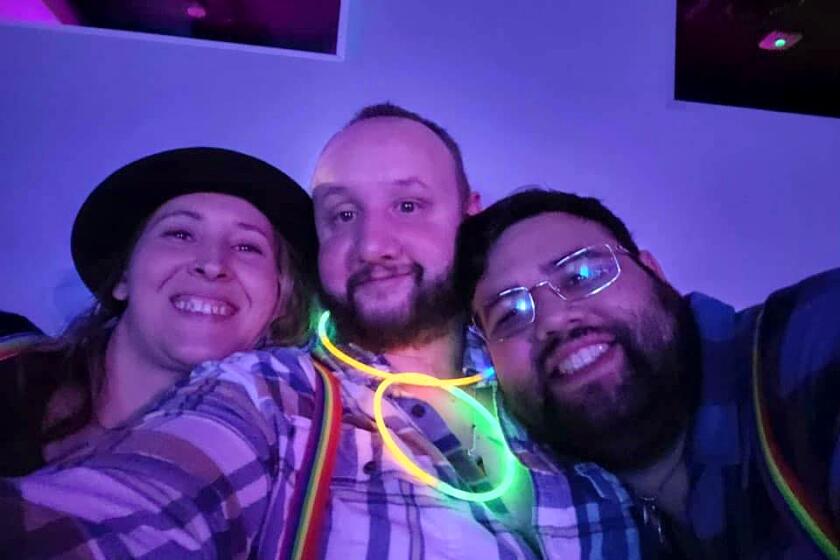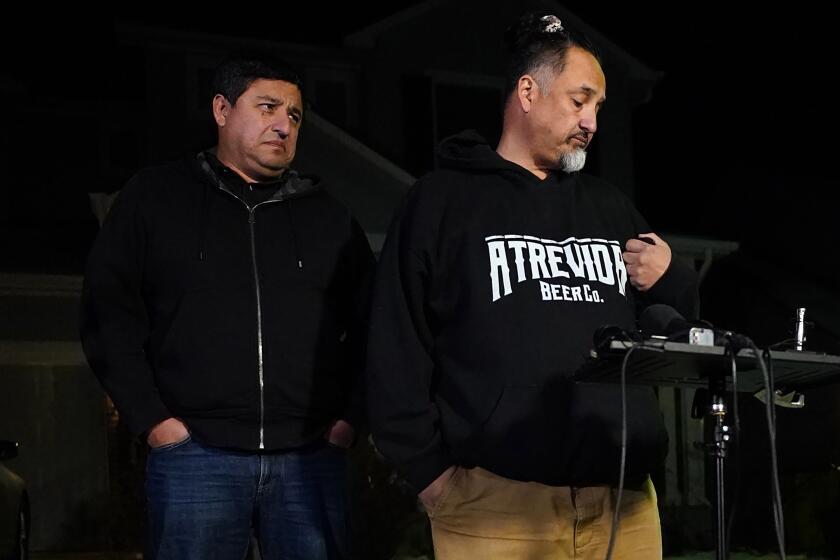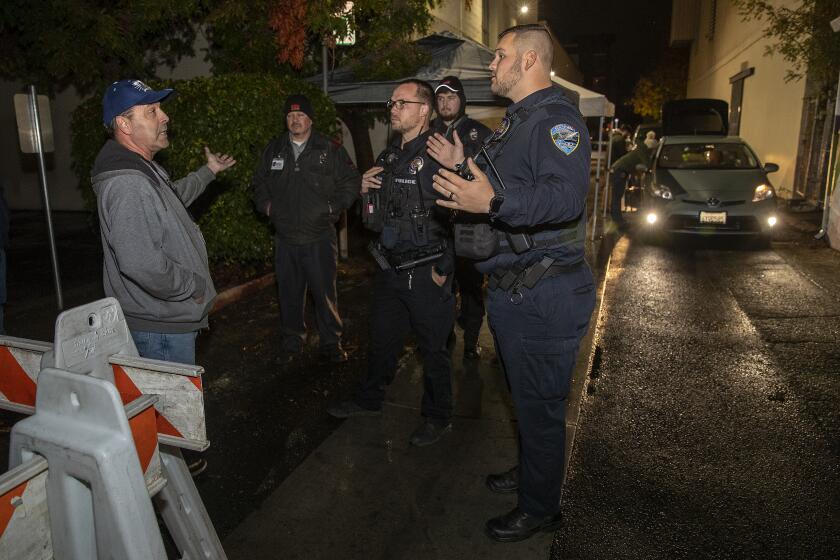In red California, LGBTQ people still feel under threat. ‘There’s no safe place anywhere’
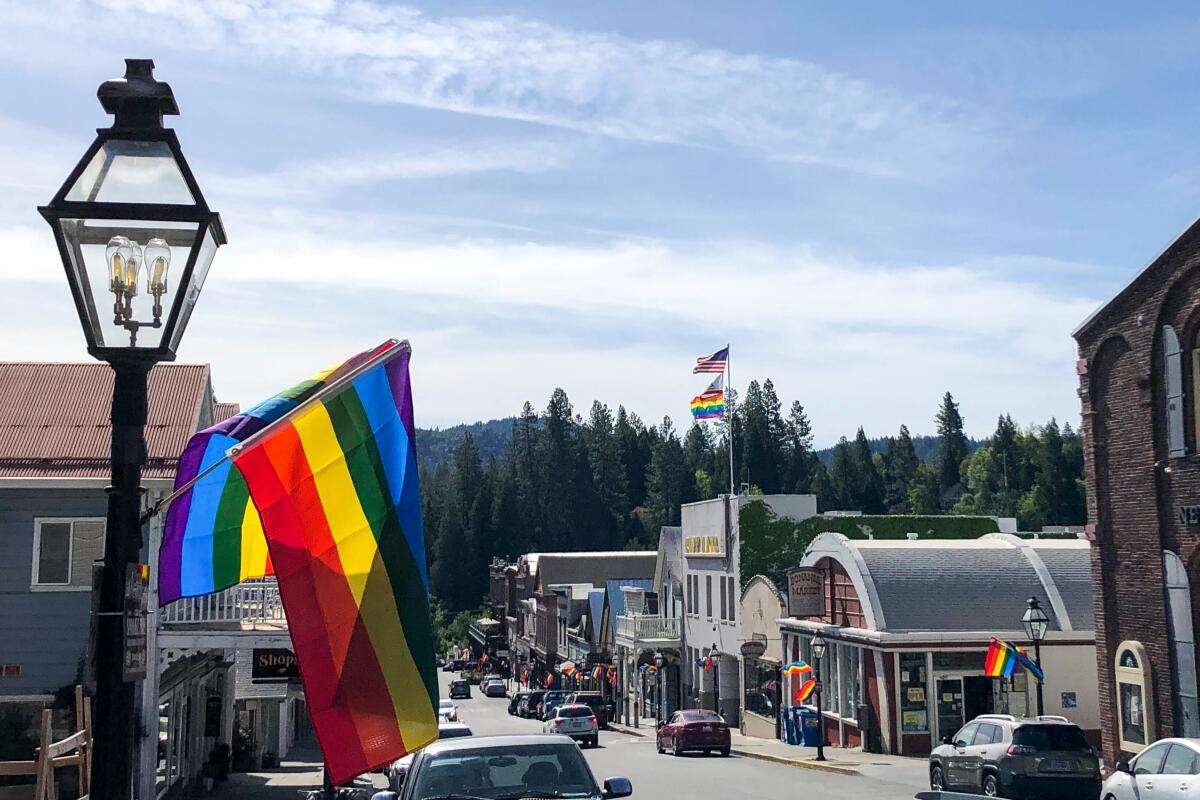
- Share via
After five people were shot dead in a gay nightclub in Colorado Springs, Colo., Matthew Grigsby thought about Club 501.
It was the only gay bar in Redding, a Northern California city of 93,000 that, like Colorado Springs, is deeply religious and conservative.
There, Grigsby felt comfortable holding hands or dancing with another man.
Club 501 closed this summer, leaving Grigsby and other LGBTQ people without a place where they could be themselves. The news from Club Q in Colorado Springs was another gut punch.
“There’s no safe place anywhere,” Grigsby, 53, said, his voice shaking. “It doesn’t matter where we are or what we do. People are going to come for us.”
In politically red stretches of California — from the old logging towns in the north through the dusty farmlands of the Central Valley — the Colorado Springs massacre was yet another devastating reminder of how difficult and lonely it can be to be queer in conservative America.
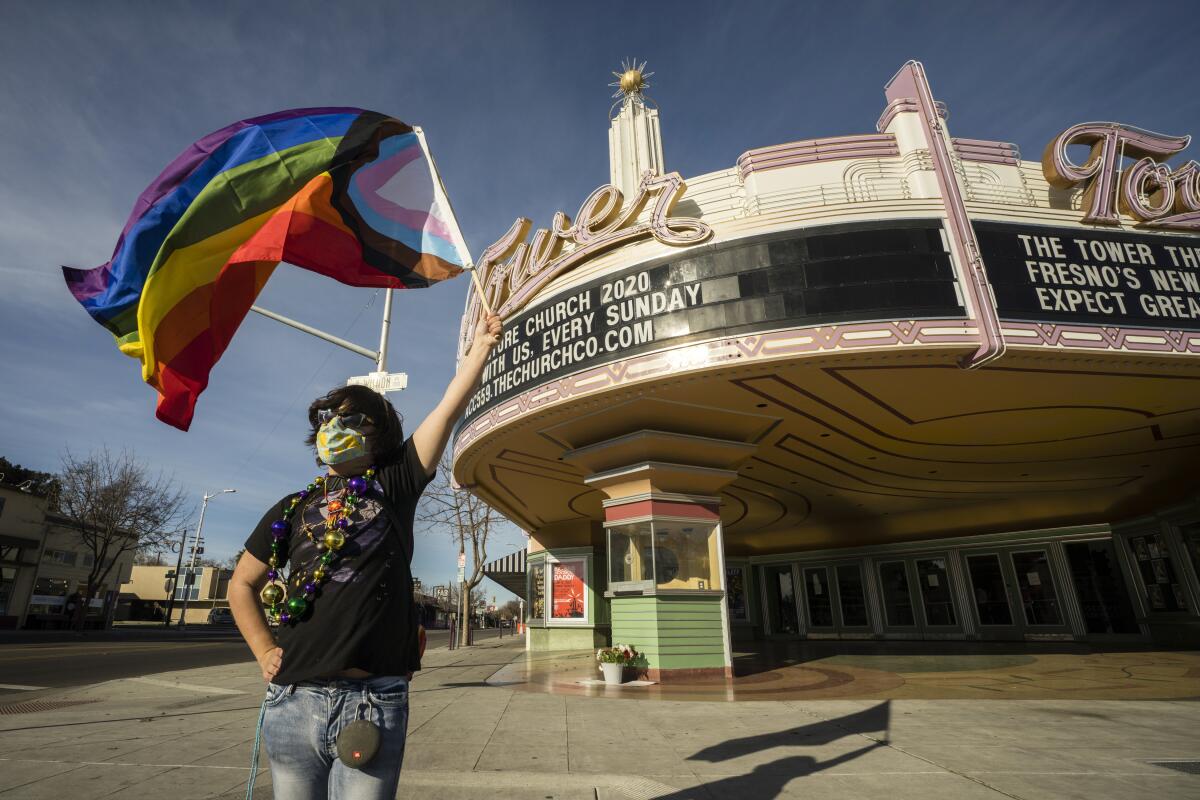
There are few, if any, gay bars or other LGBTQ-friendly hangouts in this state’s more rural counties, where queer people say they live with a growing sense of foreboding.
“Redding is predominantly conservative. Because of that, obviously it heightens our senses,” said Roberta Mayberry, spokeswoman for the Wolfpack Clubhouse, a nonprofit for LGBTQ women in Shasta County.
The Colorado Springs attack comes at a time when hateful rhetoric against LGBTQ people — especially from Republican politicians and conservative pundits — is on the rise.
Like Club 501, Club Q was a refuge for LGBTQ people. Colorado Springs is home to megachurches and influential Christian-right groups like Focus on the Family, which popularized the term “family values” and fought the legalization of same-sex marriage.
Officials have not issued a possible motive for the shooting, but it is being investigated as a hate crime.
Attorneys said the suspect, Anderson Lee Aldrich, is nonbinary and uses they/them pronouns. Aldrich is the grandchild of California Assemblyman Randy Voepel (R-Santee).
In the 12 years that Archer Lombardi owned the Chico dive bar the Maltese, which was known for its drag shows and burlesque performances, he always feared violence.
“There has never been a time where I haven’t had nightmares about someone walking in and opening fire on us,” said Lombardi, a transgender man.
Sometimes, as he swept the sidewalk in front of the bar, people screamed anti-gay slurs from pickup trucks, he said.
Club Q in Colorado Springs was what many queer bars are: a ‘safe space’ to let loose and have fun.
Lombardi closed the Maltese in February after two years of economic pain during the COVID-19 pandemic. He and his partner bought a farm. Other venues have started hosting drag shows, but there are no other gay bars in Chico, home to Cal State Chico, or the surrounding area.
“Chico is a pretty cool town and usually pretty supportive of the LGBTQ+ community for the most part,” Lombardi said. “It’s just, once you start getting out of Chico, things get a little too red and a little less gay friendly.”
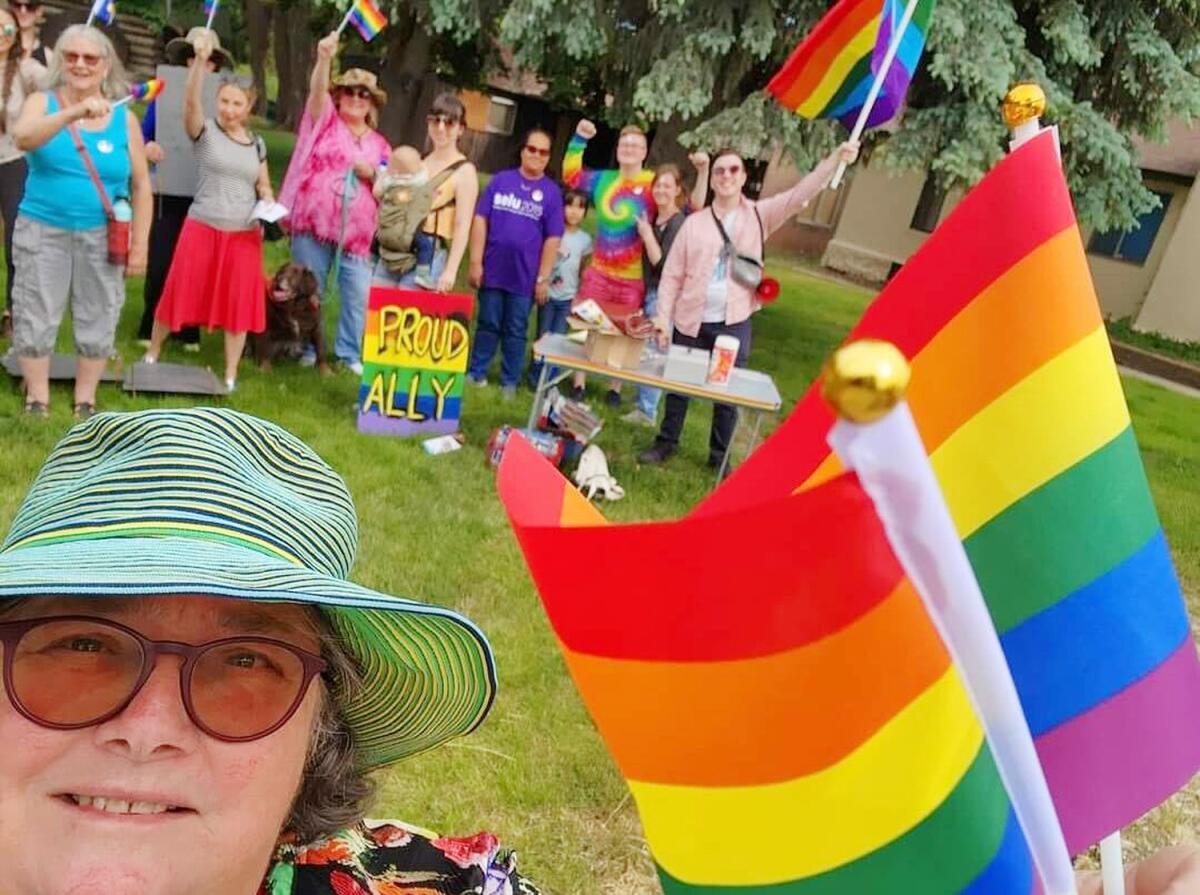
In rural California, being openly gay is an act of defiance, said Jacob Hibbitts, a board member for the fledgling Lassen Pride Network who lives in Susanville with his husband, Richard Colvin.
“We live kind of a quiet life here,” Hibbitts, 36, said. “Our home is our space to be ourselves, but you step out the door and you never know.’’
The closest gay bars are 85 miles away in Reno, or a 3½-hour drive south to Sacramento.
Hibbitts said his husband is “more effeminate” than him — favoring fancy hats, shoes with a bit of heel and purses — but tones down his appearance in Susanville for his safety.
Still, Hibbitts couldn’t resist getting him a cherry-red Dooney & Bourke purse last year. Colvin proudly flaunts it.
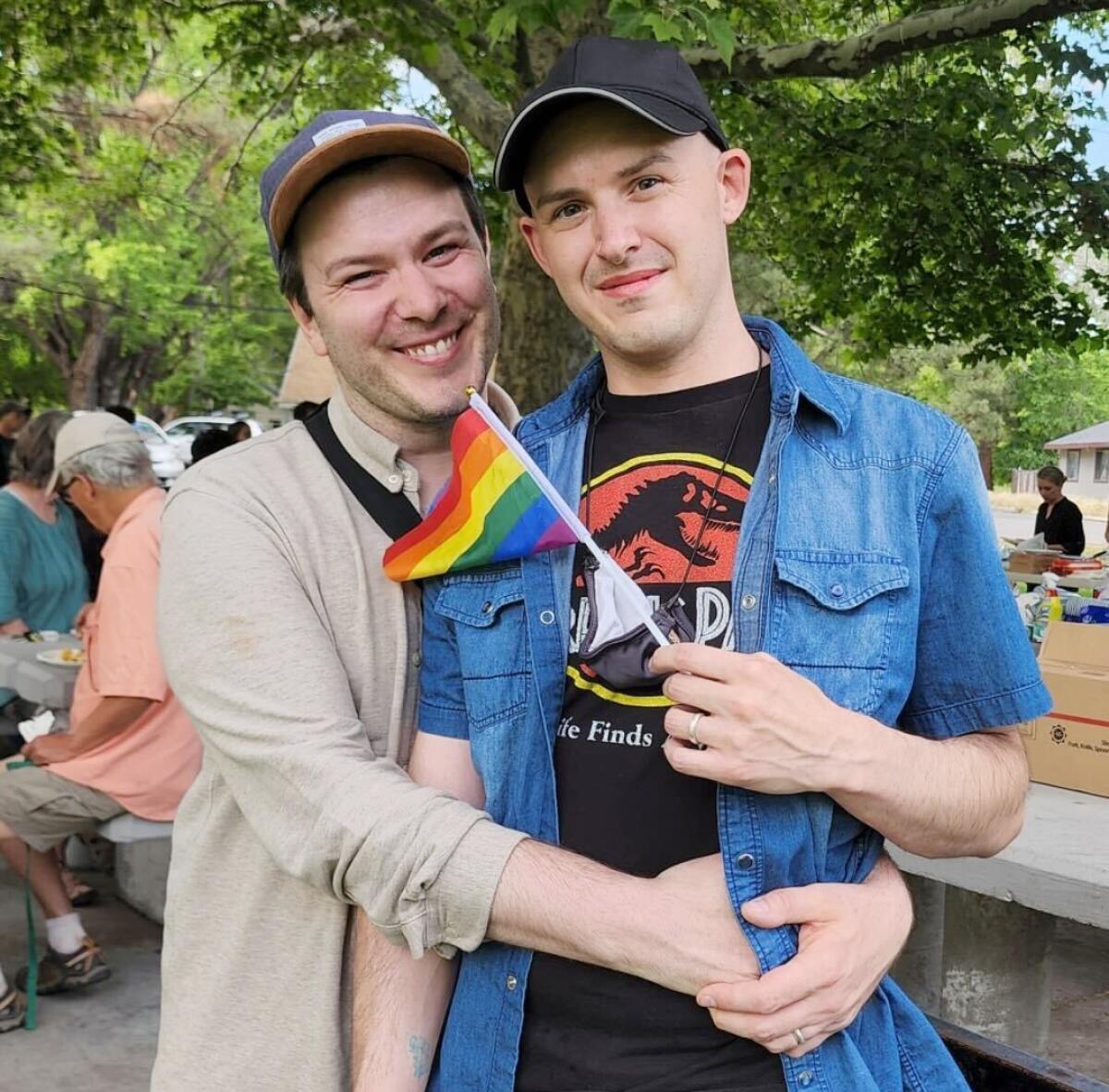
“He still wears his Dooney to Walmart just to throw it at them” — the haters — “and I love him for it,” Hibbitts said.
Hibbitts helped organize a Pride potluck at a park in Susanville this summer, a few days after a rainbow flag was stolen from outside a local domestic violence services center. Undercover and uniformed police were present.
After the Colorado shooting, organizers are nervous about having another potluck. But now, it’s more important than ever to be visible, Hibbitts said.
“We’re gonna plan to have drag queens. We are not going to be silent,” he said. “This is the queer community. If you come at us, we’re coming back at you.”
Brian Poth — a gay, retired actor who starred in “CSI: Miami,” “True Blood” and other shows — recalled the culture shock of moving back to his hometown of Visalia in agricultural Tulare County in 2014.
Poth had lived behind Hamburger Mary’s, a drag-themed burger restaurant, in West Hollywood for years.
In Visalia, there were no LGBTQ bars. He couldn’t find a therapist or doctor he trusted. There were queer-owned businesses, but they didn’t put up rainbow flags.
“I would go to Starbucks and Target because at least I would find queer people working there,” Poth said.
I said a prayer for the deceased, bemoaned our nation’s gun laws and moved on. Hopefully, the Fierros weren’t among the affected, I thought.
In 2016, he and a friend opened an LGBTQ resources center in Visalia called the Source. A month later, a gunman killed 49 people at Pulse, a gay nightclub in Orlando, Fla.
There was such a yawning need for a physical space with LGBTQ services in the San Joaquin Valley that the Source grew swiftly. It opened with a $20,000 budget. This year, it had a $2-million budget, 12 full-time employees and services for HIV patients, transgender people and youths.
Locally, upticks in anti-LGBTQ rhetoric usually come around election season, Poth said.
This fall, an event for teenagers organized by the Source — a movie screening followed by a drag show — was moved from a Visalia theater to a less visible place after school board candidates blasted it on social media and anti-LGBTQ comments grew threatening.
But for the most part, Poth said, the town has been supportive.
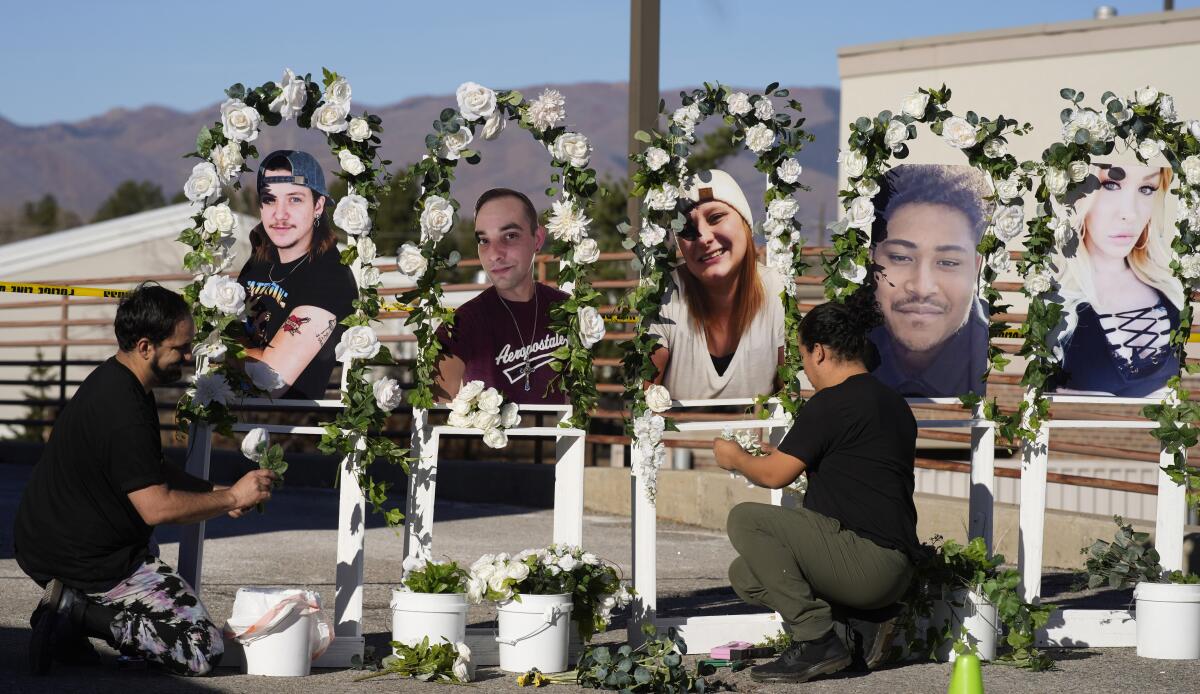
Tulare County Supervisor Amy Shuklian, the first out lesbian on the board, said that when she first ran for the Visalia City Council in 2005, her mother worried for her safety.
She has gotten a few comments about having “a gay agenda.” But she’s just as country as everyone else and feels at ease in Visalia, she said.
Shuklian grew up on her family’s farm on the Tulare and Kings county line. She has a concealed-carry weapons permit. She and her partner, Mary, have been together for more than two decades.
She said she has lived her life authentically and hopes that sets an example for others.
When she saw the news from Colorado, she thought: “Oh, God, not again.”
In Shasta County, Carlos Zapata said he too “had a pit in my stomach” when he learned about Club Q.
Zapata — a controversial figure in Northern California — is a vocal member of a local militia. He helped lead this year’s successful recall campaign against a Republican county supervisor who was ousted, in part, for upholding state-mandated COVID-19 policies.
Zapata, a Marine Corps veteran, also owns the Palomino Room, a bar and restaurant in Red Bluff. He said people would probably be surprised he is pro-LGBTQ rights. If someone ever made a gay customer “feel uncomfortable because of who they love,” he would kick them out, he said.
“This is the problem in rural America: There’s so many good things about it, but when it comes down to the views on gays, we’re so far behind and so backward on it,” he said.
Grigsby, a Shasta County government employee born and raised in Redding, said he has never felt accepted in his hometown because he is gay — except at Club 501, a tiny dive bar on a quiet side street.
“We’re tired. Down-to-the bones tired,” said Cathy Darling Allen, the Shasta County clerk and registrar of voters, who has been harassed and vilified by election deniers.
“Once you crossed the threshold, you could hold hands, you could kiss your date, you could dance together, you could hug your friends,” he said. “You could exhale and kinda shut everything out from the outside.”
Grigsby recently went on a date at a bowling alley.
“We didn’t hold hands. We didn’t sit too close together,” he said. “You don’t invite scrutiny in this town. It might look fine inside, but there might be somebody outside waiting by your car, and you have to be aware of that.”
In this climate, a lot of LGBTQ people leave rural and conservative areas, he said.
“But I’ll be damned if I get driven out of my town,” he said. “I’m not what’s wrong with this place. I’m not broken.”
Redding is home to Bethel Church, which preaches that homosexuality is sinful and opposed California bills seeking to crack down on so-called conversion therapy, which claims to “heal” people of same-sex attraction.
Members of the megachurch sometimes showed up at Club 501, bought patrons drinks — then started talking to them about God, Grigsby said.
Club 501, whose owner could not be reached for comment, closed in June.
A few days later, a motion to recognize LGBTQ Pride Month went before the Shasta County Board of Supervisors.
Some public speakers quoted Scripture and said LGBTQ people were looking for special privileges not given to straight people.
A friend of a local gay couple murdered in 1999 by two white supremacist brothers pleaded for the supervisors “to change this image of Shasta County as a hateful place.”
The motion failed.
More to Read
Sign up for Essential California
The most important California stories and recommendations in your inbox every morning.
You may occasionally receive promotional content from the Los Angeles Times.
